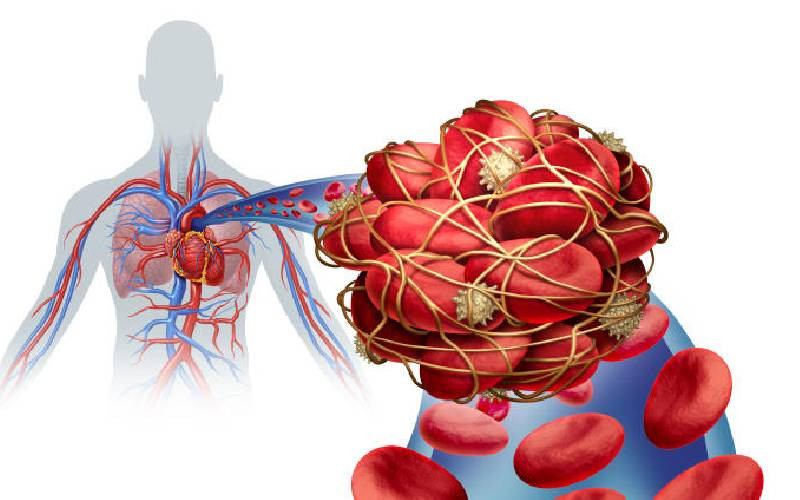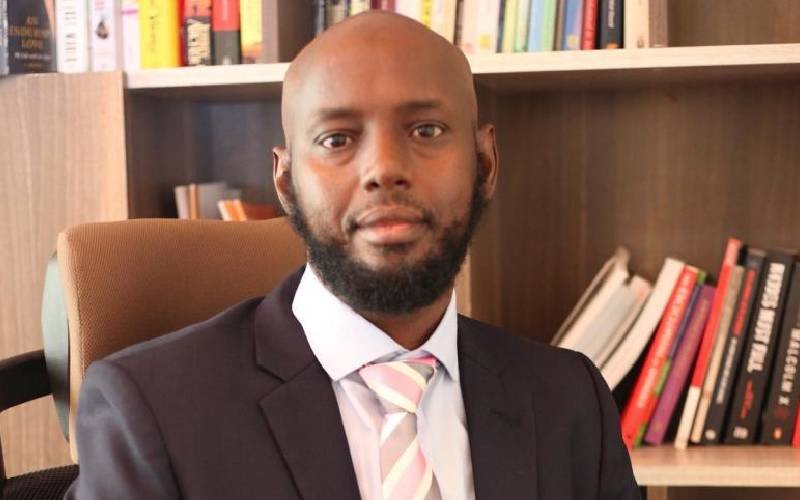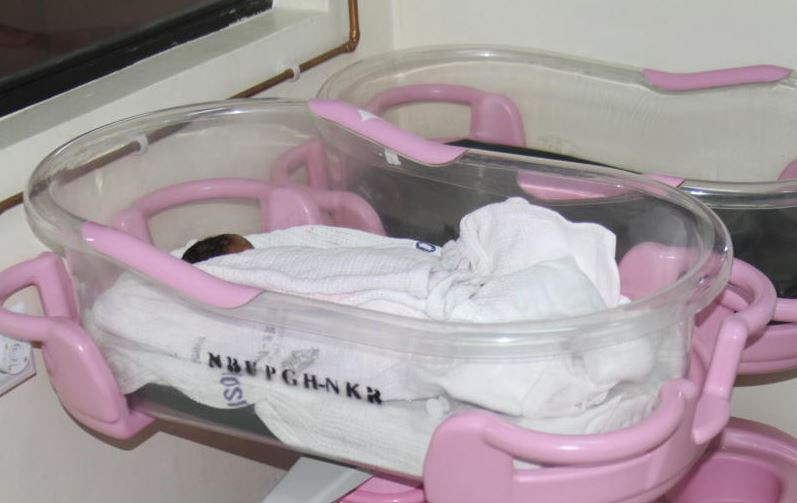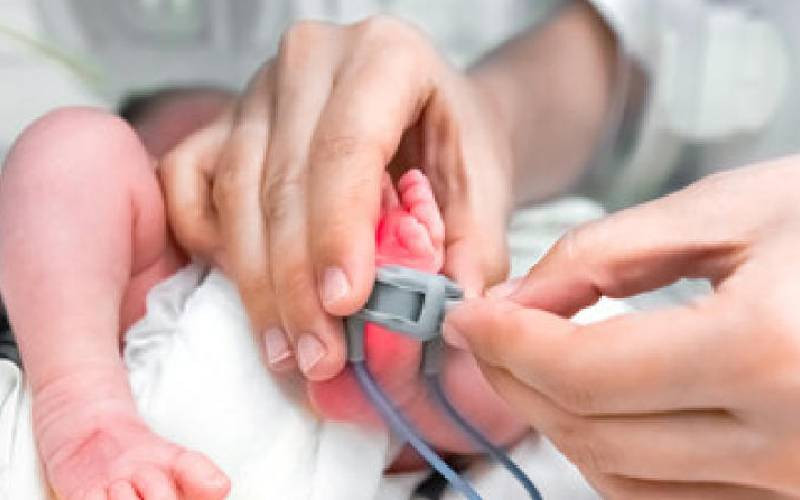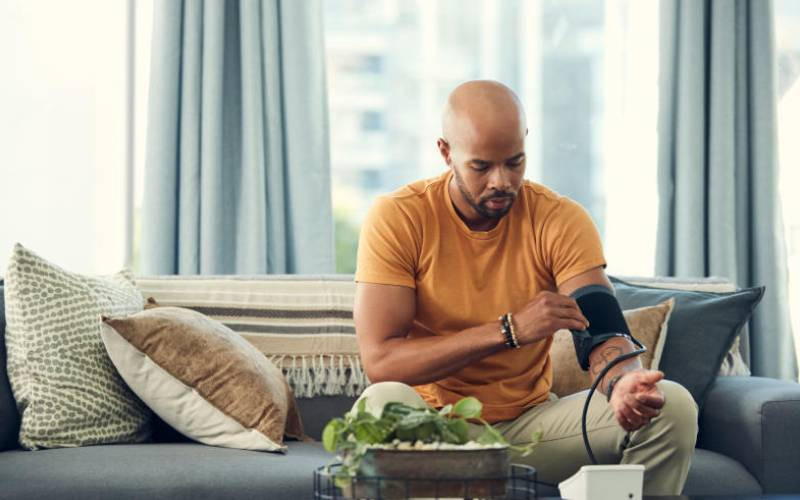
Shot of a man taking his blood pressure while sitting on the sofa at home. [File Courtesy]
Have you had your blood pressure checked lately? If not, now is the perfect time.
High blood pressure, or what is medically known as hypertension, is one of the most common health problems in Kenya today. It is silent, sneaky, and can cause serious trouble if left unchecked.
The good news is it is easy to detect, and, with a few changes in your lifestyle, you can manage it—or even avert it altogether. To understand high blood pressure, picture your blood vessels being similar to water pipes. Blood pressure is the force of blood pushing through these pipes. When the pressure gets too high, the pipes can get damaged over time, and that’s when problems like stroke, heart attacks, and kidney disease show up.
There’s a common myth that high blood pressure is an “old person’s disease.” That’s not true. Hypertension affects young people too—even those in their 30s and 40s. Many are shocked to discover they have it during routine checks. According to the World Health Organisation, over 1.3 billion people aged between 30 and 79 are living with high blood pressure globally. Of these, nearly 80 per cent are in low- and middle-income countries like Kenya.
In Africa, the number of people with hypertension is climbing fast. It jumped from about 55 million in 1990 to over 130 million in 2010, and it’s expected to hit 200 million by 2030. In Kenya, a national health survey found that 1 in 4 adults has high blood pressure, and most don’t even know it. In fact, 9 out of 10 people with high blood pressure are not on treatment.
This shows why awareness and regular check-ups are so important, especially for younger adults, who often assume they’re safe. Most people with high blood pressure feel perfectly fine—no headaches, no tiredness, nothing. That’s why it’s called the silent killer. The only way to know your pressure is out of control is by getting it checked.
The Kenya National Cardiovascular Guidelines and the European Society of Cardiology (ESC) 2024 Guidelines both stress the importance of catching high blood pressure early and treating it seriously, but smartly. Even “slightly high” blood pressure matters. You don’t have to wait until it is out of control. If it’s between 120 and 139 (the top number), it’s already time to act.
- Diabetes, hypertension silent killers in rural areas - medics
- Stage 4 cancer but still standing strong: Eunice Mwende's life after terminal diagnosis
- Understanding infertility: The myths and misconceptions
- AAR slashes sickle cell test costs in accessibility drive
Keep Reading
Don’t panic, but don’t ignore it. High blood pressure requires treatment and lifestyle changes. This is the perfect time to make changes to your lifestyle, which is the first medicine for high blood pressure. Before any pills, there are plenty of things you can do to reverse elevated blood pressure:
Eat smart – less salt, more vegetables and fruits. Cut back on red meat and fatty foods. Embrace healthy local foods like sukuma wiki, arrowroot, and avocados.
Start moving – a 30-minute walk, five days a week, makes a big difference. Dancing, jogging, or even doing active chores count!
Watch your weight – a healthy weight helps lower your pressure naturally. Reduce stress – try breathing exercises, music, prayer, or quality time with loved ones.
Limit alcohol and quit smoking – these are blood pressure boosters.
Sometimes, despite your best efforts, your blood pressure remains high. In that case, your doctor may recommend medication to help bring it down. And that’s okay! Many people live long, healthy lives on treatment, especially when they keep up the lifestyle changes.
Get your pressure checked, even if you feel fine. Talk to your healthcare provider about your numbers.
Make small changes to your meals and movement. Encourage your family and friends to do the same. Hypertension may be common, but it doesn’t have to control your life. With awareness, action, and a little support, we can all keep our hearts healthier and live longer, fuller lives. Let’s take the pressure off, one step at a time.
Dr Kerubo is a consultant physician, AAR Hospital, Kiambu Road
 The Standard Group Plc is a multi-media organization with investments in media
platforms spanning newspaper print
operations, television, radio broadcasting, digital and online services. The
Standard Group is recognized as a
leading multi-media house in Kenya with a key influence in matters of national
and international interest.
The Standard Group Plc is a multi-media organization with investments in media
platforms spanning newspaper print
operations, television, radio broadcasting, digital and online services. The
Standard Group is recognized as a
leading multi-media house in Kenya with a key influence in matters of national
and international interest.


